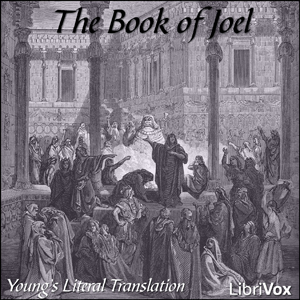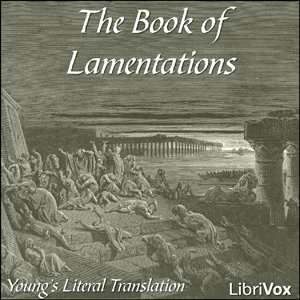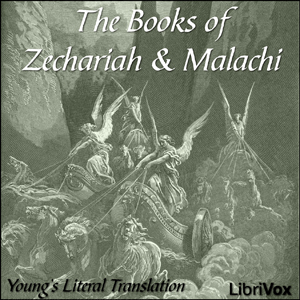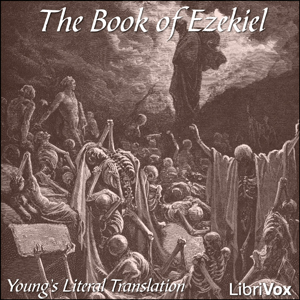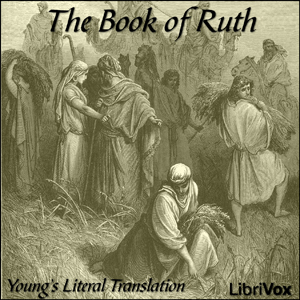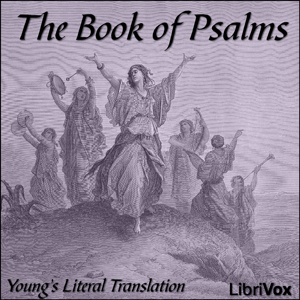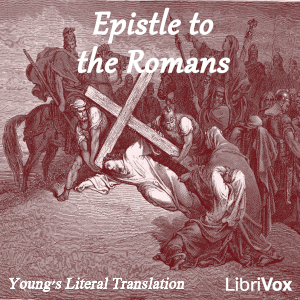Young's Literal Translation is a translation of the Bible into English, published in 1862. The translation was made by Robert Young, compiler of Young's Analytical Concordance to the Bible and Concise Critical Comments on the New Testament. Young produced a "Revised Version" of the translation in 1887. After he died on October 14, 1888, the publisher in 1898 released a new Revised Edition. (Summary from Wikipedia)
3 episodes
Young's Literal Translation is a translation of the Bible into English, published in 1862. The translation was made by Robert Young, compiler of Young's Analytical Concordance to the Bible and Concise Critical Comments on the New Testament. Young produced a "Revised Version" of the translation in 1887. After he died on October 14, 1888, the publisher in 1898 released a new Revised Edition. (Summary from Wikipedia)
1 episodes
Young's Literal Translation is a translation of the Bible into English, published in 1862. The translation was made by Robert Young, compiler of Young's Analytical Concordance to the Bible and Concise Critical Comments on the New Testament. Young produced a "Revised Version" of the translation in 1887. After he died on October 14, 1888, the publisher in 1898 released a new Revised Edition. (Summary from Wikipedia)
1 episodes
Young's Literal Translation is a translation of the Bible into English, published in 1862. The translation was made by Robert Young, compiler of Young's Analytical Concordance to the Bible and Concise Critical Comments on the New Testament. Young produced a "Revised Version" of the translation in 1887. After he died on October 14, 1888, the publisher in 1898 released a new Revised Edition. (Summary from Wikipedia)
1 episodes
Young's Literal Translation is a translation of the Bible into English, published in 1862. The translation was made by Robert Young, compiler of Young's Analytical Concordance to the Bible and Concise Critical Comments on the New Testament. Young produced a "Revised Version" of the translation in 1887. After he died on October 14, 1888, the publisher in 1898 released a new Revised Edition.(Summary from Wikipedia)
1 episodes
Young's Literal Translation is a translation of the Bible into English, published in 1862. The translation was made by Robert Young, compiler of Young's Analytical Concordance to the Bible and Concise Critical Comments on the New Testament. Young produced a "Revised Version" of the translation in 1887. After he died on October 14, 1888, the publisher in 1898 released a new Revised Edition. (Summary from Wikipedia)
6 episodes
Young's Literal Translation is a translation of the Bible into English, published in 1862. The translation was made by Robert Young, compiler of Young's Analytical Concordance to the Bible and Concise Critical Comments on the New Testament. Young produced a "Revised Version" of the translation in 1887. After he died on October 14, 1888, the publisher in 1898 released a new Revised Edition. (Summary from Wikipedia)
8 episodes
Young's Literal Translation is a translation of the Bible into English, published in 1862. The translation was made by Robert Young, compiler of Young's Analytical Concordance to the Bible and Concise Critical Comments on the New Testament. Young produced a "Revised Edition" of the translation in 1887. After he died on October 14, 1888, the publisher in 1898 released a new Revised Edition. (Summary from Wikipedia)
1 episodes
Young's Literal Translation is a translation of the Bible into English, published in 1862. The translation was made by Robert Young, compiler of Young's Analytical Concordance to the Bible and Concise Critical Comments on the New Testament. Young produced a "Revised Edition" of the translation in 1887. After he died on October 14, 1888, the publisher in 1898 released a new Revised Edition. (Summary from Wikipedia)
10 episodes
Young's Literal Translation is a translation of the Bible into English, published in 1862. The translation was made by Robert Young, compiler of Young's Analytical Concordance to the Bible and Concise Critical Comments on the New Testament. Young produced a "Revised Edition" of the translation in 1887. After he died on October 14, 1888, the publisher in 1898 released a new Revised Edition. (Summary from Wikipedia)
6 episodes
Young’s Literal Translation is a translation of the Bible into English, published in 1862. The translation was made by Robert Young, compiler of Young’s Analytical Concordance to the Bible and Concise Critical Comments on the New Testament. Young produced a “Revised Edition” of the translation in 1887. After he died on October 14, 1888, the publisher in 1898 released a new Revised Edition. (Summary from Wikipedia)
8 episodes
Young’s Literal Translation is a translation of the Bible into English, published in 1862. The translation was made by Robert Young, compiler of Young’s Analytical Concordance to the Bible and Concise Critical Comments on the New Testament. Young produced a “Revised Edition” of the translation in 1887. After he died on October 14, 1888, the publisher in 1898 released a new Revised Edition. (Summary from Wikipedia)
4 episodes
Young’s Literal Translation is a translation of the Bible into English, published in 1862. The translation was made by Robert Young, compiler of Young’s Analytical Concordance to the Bible and Concise Critical Comments on the New Testament. Young produced a “Revised Edition” of the translation in 1887. After he died on October 14, 1888, the publisher in 1898 released a new Revised Edition. (Summary from Wikipedia)
7 episodes
Young’s Literal Translation is a translation of the Bible into English, published in 1862. The translation was made by Robert Young, compiler of Young’s Analytical Concordance to the Bible and Concise Critical Comments on the New Testament. Young produced a “Revised Edition” of the translation in 1887. After he died on October 14, 1888, the publisher in 1898 released a new Revised Edition. (Summary from Wikipedia)
7 episodes
This book tells of the leadership of Joshua, aide to the late prophet/leader Moses, and the division of territories amongst the 12 tribes of Israel. The toppling of the Wall of Jericho is one of the most popular stories in this book. (Introduction by Mark Penfold)Young’s Literal Translation is a translation of the Bible into English, published in 1862. The translation was made by Robert Young, compiler of Young’s Analytical Concordance to the Bible and Concise Critical Comments on the New Testament. Young produced a “Revised Edition” of the translation in 1887. After he died on October 14, 1888, the publisher in 1898 released a new Revised Edition. (Summary from Wikipedia)
4 episodes
The Psalms are the Israelites' songs of joy and sadness, contentment and complaint, happiness and suffering---but most of all, praise. King David is the most prolific contributor, but there are also psalms from his son Solomon, the sons of Korah, the worship leader Asaph, and even one from Moses! (Introduction by Mark Penfold)
15 episodes
The Book of The Judges is a record of the Israelites' pattern of continuing disobedience to God, and their salvation by God through judges chosen to lead the people. (Introduction by Mark Penfold)
4 episodes
This book describes the return of Israelites from exile in Babylon. One group returns to rebuild the Temple and restore the worship of The LORD, while the second group, led by the priest and scribe Ezra, returns to re-establish Mosaic law to the Israelite community. The Books of Ezra and Nehemiah were once considered one book. (Introduction by Mark Penfold)
2 episodes
This book contains small morsels of great practical wisdom and instruction for all. Solomon, no doubt, wrote the majority of this book, but the last proverb was authored by a King Lemuel, who wrote of the wisdom imparted to him by his mother. (Introduction by Mark Penfold)
4 episodes
Not just a big book of geneaological lists, it is a record of things not mentioned in the Books of Samuel and Kings. It tells us of the kingdom of David and his life, but also gives us incredible spiritual truths. (Introduction by Mark Penfold)
6 episodes
Nehemiah is the story of a man determined to restore the Temple, as well as the strength and integrity of the Nation of Israel. A lowly butler to a mighty king, Nehemiah rises to a postition of prominence among his people as he reminds them of their obligation to the Law of Moses. Nehemiah is a man of prayer and deep reverence to his God who is constantly on the look-out for his people, as well as for those who disobey the Law and the Sabbath day. (Introduction by Mark Penfold)
2 episodes
Rather than repeating the vast geneaology of King David found in the First Book of The Chronicles, the Second Book of The Chronicles recounts the rulership of the kings descended from him, namely, from his son Solomon to the evil king Zedekiah (called Zakeriah in Fenton's version, Zedekiah in NIV). (Introduction by Mark Penfold)
6 episodes

The Book of Ecclesiastes ( /ɨˌkliːziˈæstiːz/; literally "Book of the Teacher"; Hebrew: קֹהֶלֶת, Qoheleth), commonly referred to simply as Ecclesiastes (abbreviated "Ecc."), is a book of the Hebrew Bible. The English name derives from the Greek translation of the Hebrew title.The main speaker in the book, identified by the name or title Qoheleth (usually translated as "teacher" or "preacher"), introduces himself as "son of David, king in Jerusalem." The work consists of personal or autobiographic matter, at times expressed in aphorisms and maxims illuminated in terse paragraphs with reflections on the meaning of life and the best way of life. The work emphatically proclaims all the actions of man to be inherently "vain", "futile", "empty", "meaningless", "temporary", "transitory", "fleeting, or "mere breath", depending on translation, as the lives of both wise and foolish men end in death. While Qoheleth clearly endorses wisdom as a means for a well-lived earthly life, he is unable to ascribe eternal meaning to it. In light of this perceived senselessness, he suggests that one should enjoy the simple pleasures of daily life, such as eating, drinking, and taking enjoyment in one's work, which are gifts from the hand of God.According to the Talmud, however, the point of Qoheleth is to state that all is futile under the Sun. One should therefore put all one's efforts towards that which is above the Sun. This is summed up in the second to last verse: "The end of the matter; all has been heard. Fear God, and keep His commandments; for that is the whole duty of everyone" (12:13).The book is particularly notable for its iconic phrases, "the sun also rises," "[there's] nothing new under the sun" ('nihil novi sub sole' in the Latin Vulgate) and "he who increaseth knowledge, increaseth sorrow."(Introduction by Wikipedia)
1 episodes

The Song of Songs, also known as the Song of Solomon, the Canticle of Canticles, or simply Canticles, is one of the books of the Ketuvim (the "Writings", the last section of the Hebrew Bible), and the fifth of the "wisdom" books of the Christian Old Testament. Scripturally, the Song of Songs is unique in that it makes no reference to "Law" or "Covenant", nor does it teach or explore "wisdom" in the manner of Proverbs or Ecclesiastes. Instead, it celebrates sexual love. It gives "the voices of two lovers, praising each other, yearning for each other, proffering invitations to enjoy". The two are in harmony, each desiring the other and rejoicing in sexual intimacy; the women (or "daughters") of Jerusalem form a chorus to the lovers, functioning as an audience whose participation in the lovers' erotic encounters facilitates the participation of the reader.
Jewish tradition reads it as an allegory of the relationship between God and Israel. Christian tradition, in addition to appreciating the literal meaning of a romantic song between man and woman, has read the poem as an allegory of Christ (the bridegroom) and his Church (the bride). (Summary modified from Wikipedia)Cast:
Narrator / Brothers: Larry WilsonWoman: EzwaMan: Mark PenfoldFriends: TriciaG
Audio edited by TriciaG
8 episodes
In the First Book of Samuel, the people of Israel asked for an earthly king so it could be just like the other nations, a king to fight its battles and lead the people to glory. But, as this Second Book of the Kings makes quite clear, that demand was a mistake. God was their king, and told the people through his prophet, Samuel, about the demands their kings would make upon them, good or evil. As the old saying goes, "Be careful what you wish for." - Summary by Mark Penfold
5 episodes
An English translation that holds as closely as was possible to the original languages and idioms. - Summary by KevinS
3 episodes
An English translation that holds as closely as was possible to the original languages and idioms. (Summary by KevinS)
5 episodes
An English translation that holds as closely as was possible to the original languages and idioms. - Summary by KevinS
1 episodes
An English translation that holds as closely as was possible to the original languages and idioms. - Summary by KevinS
1 episodes
An English translation made as closely as possible to the language and idioms of the original languages. - Summary by KevinS
1 episodes
An English translation made as closely to the original languages and idioms as possible - Summary by KevinS
5 episodes
A literal translation of the Epistle to Titus from the New Testament translated as closely as possible to the language and idioms of the original. - Summary by KevinS
1 episodes
A literal translation that holds closely to the original language and idioms. (Summary by KevinS)
3 episodes
The Epistle to the Romans is the sixth book in the New Testament, written by Paul to the believers in Rome. It is perhaps the best epistle for outlining the basic foundations of Christian faith, from man's depravity and need for a savior, to salvation given through faith in Christ, to how believers should live in consequence of such a salvation. - Summary by TriciaG
8 episodes
The Epistle of James translated according to the letter and idioms of the original language. Summary by KevinS
1 episodes

